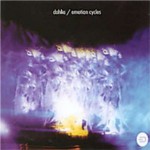 Dahlia
Dahlia
Emotion Cycles
Auditory Sculpture
For the past couple of years, Dahlia have been accruing well-deserved praise from local scribes and club-goers alike for their sometimes electrifying live performances, primarily conducted at the Ohm. With the aid of ace soundman Jay Bozich, the duo of synthman Keith Schreiner and singer Jennifer Folker are renowned to create their music extemporaneously.
This is not difficult to imagine given Schreiner’s penchant for forging thick, dreamy synth moods, typically driven by a straight-forward sampled beat. Schreiner generally deals in musical shapes and shades; educing trance-like states, through which Folker’s powerful voice penetrates with laser precision. Folker has the dynamism of Björk, the intimacy of Tori Amos, the informed lyricism of Dido, the antique mysticism of Beth Gibbons of Portishead, the style and strength of Annie Lennox and the purity of Enya. In fact, the sentiments expressed for a good portion of this album could nearly pass for New Age.
However, Folker’s immense talents are immediately on display, from the first track, “Forget This Place,” to the last, “Serenity.” The former builds upon guest Derek Simms’ muted-trumpet, and a flutey synth theme, which Folker mirrors with a charismatic vocal. Over a satisfying percussive collage (abetted by guest drummer Jeff Anthony), Jennifer reaches Lennoxian territory in the emotive vocal passages in the middle section. Intense.
She is more coy on the vaguely Eastern-flavored “Armageddon.” A stripped down keyboard arrangement affords her the space to play more freely with her vocal lines. Onerous string lines threaten to entangle the arrangement, but are wisely restrained, just as they are about to get out of hand.
On “Avalon,” oppressive drums and bass stamp out Jennifer’s tribute to Edith Piaf. Her plaintive vocal lines play well against Schreiner’s subtle keyboard inflections, but fall beneath the wheels of a runaway drum machine. Schreiner sets up an infectious drum/bass mood for “My Back.” Syncopated drum rhythms dance around an insistent synthbass line. Jennifer’s vocal is aggressive at first, but turns soft like Portishead (and somewhat reminiscent of Kate Bush’s “Mother” from Hounds Of Love, as well) in the middle, over Simms’ bluesy trumpet; before kicking back into overdrive and back to soft again. A satisfying performance.
“Ray Down” explores a distinctly Celtic motif, with Schreiner providing broadsweeping piano arpeggios over two chords, as Folker wails angelically, not unlike the ghost of Sandy Denny haunting some faraway windswept moor. Majestic in its simplicity. Riding a smart keybassline and a propulsive beat, “Live In Light,” rides keyboard parts that seem well-suited to a David Lynch film, as Jennifer unleashes vocal layers worthy of Sarah McLachlan herself. A pretty, impassioned song.
“Lilia” begins with Schreiner’s interplay between Spanish guitar and piano sounds. While maintaining those themes on apparitional organ, a solid kickdrum enters with an uptempo dance beat, accented by a marimba-like tones. Folker scats over the top with International flair and abandon.
The inclusion of “Tour(Live)” gives the uninitiated some idea of what the band is like on stage. Folker’s vocal (with the aid of an intense delay effect), becomes an increasingly agitated chorus, as Schreiner runs through a series of odd sounds, before settling into a sample and hold grove against a punchy drum machine beat . Next Folker returns, her voice altered with distorted effects. From there things quickly devolve into an orgiastic tribal hoedown, with little whipsnaps included. Very cool.
Schreiner’s keyboards on “Ease Up” could easily be mistaken for those of Enya, although Jennifer’s vocal is far more animated than the highly sedate Irish lass. Sometimes Folker sounds a bit like Monica Nelson of Portland’s own Obituaries fame. However, Jennifer’s duet with sampled Middle Eastern chants, display a facility and versatility that is far more highly developed. Obviously she is availed of very special talent as a singer.
Schreiner’s Enya-like keyboards continue on ”Marcella Behind Liquid Blue Eyes,” but a driving drumbeat helps to motivate the song. Jennifer’s supple voice bends and twists expertly, with a tremulous vulnerability, akin to that of Tori Amos. The final track, “Serenity,” is suspended in an alien atmosphere, with odd, whirring, mechanical sounds emanating from the mist. Eventually a theme evolves, with a syncopated beat spurring the song on. Folker’s impassioned and passionate vocal creates a simmering tension, as Schreiner’s ambient sounds cycle through the sonic picture. The hidden track is a straightforward dance track, at times not unlike some of Madonna’s more World informed recent tracks.
Dahlia exhibit a dazzling array of chops. Both Keith Schreiner and Jennifer Folker are rare talents. It is rarer still that they found each other, developing a vitally new sound combination of their own. This, their first album captures all of the possibility the duo possess.
Schreiner needs to learn to reign in his more rampant Techno impulses, to allow Folker more sonic space in which to explore a wider palette of vocal dynamics. While much of what Jennifer sings is quite beautiful, it is not always particularly memorable. There are times when a song would be as appreciated as an arrangement. Concentration on crafting better songs will help the band immensely. They are very talented and loaded with potential.
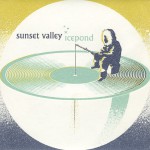 Sunset Valley
Sunset Valley
Icepond
Barsuk Records
Sunset Valley frontman Herman Jolly orbits between Portland and Bozeman, Montana., with Montana apparently being his current home. This, the third Sunset Valley album, behind 1998’s The New Speed and 1999’s Boyscout Superhero, continues the band’s tradition of cranking out stellar Pop odes, somewhat along the lines of the Replacements, the Pansies or the Gin Blossoms.
Jolly’s back-up band: bassist Eric Furlong and drummer/guitarist/multi-instrumentalist Jonathan Drews, have been playing around town since coming to Portland as the Canaries. Furlong’s services have been in high demand, as he has apprenticed with several acts, most notably with Brian Berg’s 44 Long. Furlong and Drews (as a guitarist) backed Kaitlin Ni Donovan on her groundbreaking ‘99 album release, 3 Days. Here, the strong Pop sensibilities Furlong and Drews displayed even back with the Canaries, are employed to great use in support of Jolly’s delightful compositions.
Reflecting a distinct ‘60s/’70s sensibility, “Say Ow” recalls the early Who, while “Blackberry Bushes” is reminiscent of Syd Barrett-period Pink Floyd. “Nico Ride” wriggles with rubbery vibrato similar to Tommy James & the Shondells’ “Crimson And Clover,” with a memorable guitar figure snaking through the psychedelic haze. The title track bears more than a passing resemblance to T Rex; Jolly’s clipped vocal paralleling those of Marc Bolin. Meanwhile, “Misery Jet” flies smoothly on a streamlined beat, cheerfully chugging along, as America-like harmonies chirp away on the sides. Very nice.
The uptempo numbers, such as “Wired Nights” and “Touch You” churn with burning guitar urgency. The former rocks hard like Everclear’s “Heroin Girl,” guitars exploding across the sonic horizon. The latter cut turns on a fiery guitar riff, similar and equal to the Dandy Warhol’s best Stones sendups, with Small Faces-like “la-la” vocals in the chorus. Great stuff.
The epic of the set is “Joseph Blow,” a softspoken Folkish parable about a poor, lost middle-aged soul, whose “mind is just an apple core/kicked too much acid/Now he’s flaccid and a bore.” With intimations of Space Oddity period Bowie, “Matinee Idol” is languidly bleak audio noir.
“Parade On My Rain,” rides a scintillating beat, buoyant guitars and Jolly’s sinuous vocal delivery. An underground hit! “Fall Fly” and “Help Me Babe” are lazy numbers with a Country edge. “Janey-O” is a little jauntier.
Sunset Valley are not going to set the world on fire with their energy. But that is obviously not the point. Herman Jolly’s songs speak to a hardscrabble existence, where pleasures are few and, thus, to be treasured. Sunset Valley make evocative music that tugs at the awareness of a thinking human being.
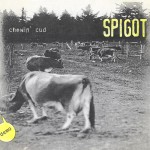 Spigot
Spigot
Chewin’ Cud (Preview)
Self-Produced
Spigot are the brainchild of singer/songwriter/multi-instrumentalist Nann Alleman, who was previously affiliated, at one time, with Mad Hattie. Like that band, Spigot cook up a homespun brand of Folkbilly cornpone, with Alleman’s warm, lithesome drawl spread thick as butter and molasses all over the five songs presented here. Nann’s the real article, not unlike an AltCountry version of Ricki Lee Jones or a back country Nanci Griffith; a mutant love child conceived between Hank Williams, Dolly Parton, Loretta Lynn and Emmy Lou Harris.
A two-step foot stomper, Alleman kicks off “Millie In The Garden” with plucky banjo stylings, while fellow Mad Hattie member, David Lipkind, adds locomotive harmonica licks, while Nann ladles out the possum stew. Eee-haww! “Mending The Nets” is a bit of a rag, on which Lipkind contributes some well-rendered harmonica fills. Lyrically, Nann relates a fisherman’s tale about the one that got away.
Matt Kramer’s muscular drumwork lends “Blue Hair” a lurching Little Feat-ish strut. Nann adds a charming vocal presentation, steeped in swampwater and bayou mud. If Nann’s twang became anymore pronounced on “Swatters Rites,” the song would be nearly unintelligible, but of value as an artifact of a dying dialect. Kramer pushes “Silly Season,” as Alleman tells a distinctly local tale, where the action ends at the waterfront, “at the beer tent/And the festival queens/tugging their tiaras/with their pointy heels sinkin’ in the mud.”
The air of authenticity one perceives around Nann Alleman is genuine, if somewhat of a manifestation of a vivid imagination. Her vocal accent changes from song to song. It’s as if she is re-creating a lost language, that, in reality, never existed in the first place; but, the authenticity of which cannot be disputed, as it is the product of Alleman’s fertile personae, whether it is real or merely imagined.
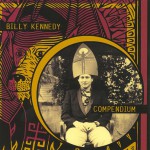 Billy Kennedy
Billy Kennedy
Compendium
Billy K Records
It is unclear whether Billy Kennedy is considered to be the local musical treasure that he most certainly is. For nearly twenty years he has performed in local acts, all centered upon his unpredictable nature with a song and an arrangement. As well as his eclectic repertoire, and well-earned reputation as a live performer with a Tourrette’s-like delivery, Billy has always been the center of a loyal cadre of fine musicians, who tend to congregate around his favored clubs of the moment.
Exactly what it says it is, Compendium is a collection of fourteen songs, eight Billy Kennedy originals, most culled from two extended sessions: eight songs recorded in 1989 at the PCC Cascade studios, produced by Lowell John Mitchell; and four songs recorded in Austin in 1993 by Scott McGregor.
It is true that the definitive Billy Kennedy album probably does not exist. Billy made many recordings in the ‘80s, but none ever matched his dynamic live performances. This assortment of performances captures Billy in all his
various guises: the mad beat poet of “Triste Un Kelde,” Karin Shelter” and “Spoonfed”; the unique interpreter of traditional songs such as “Kansas City,” “Motherless Child,” and “Babe, I’m Gonna Leave; as well as the songs of the Rolling Stones (“Until The Next Goodbye”) and Iggy Pop (“Passenger”), and as a composer of songs such as “March No.1” Girl Of My Dreams,” “Twinkle Twinkle Paradise” and “Come Down Easy.”
The performances here are uneven. Some of the songs suffer from Billy’s penchant for adding subsequent tracks apparently unrelated to the primary recording. Sometimes it seems as if material that was supposed to be erased has found its way onto the master. It is an effect similar to a double exposure in photography; and, as in that medium, the trick rarely works.
So, while this is not the ultimate Billy Kennedy syllabus, it contains enough traces of his genius to be of historical significance. And while the recording quality is nothing special, it is a fine catalog of some of Kennedy’s more prominent idiosyncratic quirks and mannerisms; which, after all, are the characteristics that made him popular in the first place.
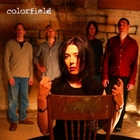 Colorfield
Colorfield
Colorfield
Self-Produced
Vocalist/keyboardist Carla Kendall-Bray sings with the effortlessness and easy assurance of a seasoned pro, who has honed her chops in countless cover bands over the years. The other three members of the band, drummer David Kendall, guitarist Patrick Gould and bassist Michael Budd are equally adept at providing fluid, facile, accompaniment. But the band is a bit faceless. Like ‘Til Tuesday. Let’s see, there was Aimee Mann and…?
But Colorfield really have much more in common with Quarterflash. Bray’s lovely falsetto and the emotive cry in her voice, resemble no one more than Rindy Ross. All of the songs are well written, with pretty, if somewhat predictable, choruses. “Air” stands out, especially, as an uplifting number. ”I will find you/where sky meets air,” may stand as one of the vital koans for our New Age.
“Magdalena” bequeaths similar, epic sentiments. “She had a heart as big as a galaxy/And a spirit just as high/She was free as the wind/She was free as the sky.” The female character in “Arizona” bears analogous heroic attributes, with Bray’s slightly overwrought vocals wringing every drop of bathos from the scenario.
Colorfield seem caught out of time. Their earnest, introspective songs are anachronistic in an era where “I smell sex and candy” qualifies as a good hookline. It is difficult to know what the band aims to achieve or the message they hope to impart. They are a pleasant and inoffensive musical aggregation, competent and well-meaning. There must be a place in the world for a band like that. There must be, doggone it.
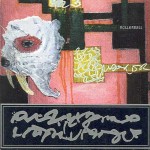 Rollerball
Rollerball
Trail Of The Butter Yeti
Road Cone Records
Doggedly non-conformist (and often altogether anti-musical) Rollerball plot a defiant course through the Pop music minefields, determined to lob one last sonic grenade in the direction of dark mistress Britney Spears, before she devours us all. There are not exactly moments of beauty here. It’s more like moments of less ugliness; of reduced irritation. Frank Zappa and Arnold Schoenberg jamming with Dizzy Gillespie. Masturbatory free (fall) Jazz conundrums, jettisoned like so much hooey in the musical vomitorium.
There’s an attitude here, in this the band’s fourth full-length assault. It is an attitude of contempt and disdain. Exclusionary and fascistic. You’re stupid if you don’t find Rollerball hip. You’re a fool if you do. Occasionally the band members tip-off that they do know how to play their instruments.
Check out “Lon Cheney,” where Mae Starr’s roiling, contrapuntal piano lines cascade elegantly against the discord of s. DeLeon’s trumpet and Amanda Mason Wiles’ sax. Then Starr jumps in with ominously sonorous vocals; from which various musical interludes unfold. An ambitious piece. “Butter Fairy” would seem to be a composition for Western gamelan, a satisfying admixture of musical tones and electronic sounds, with occasional clarinet themes thrown in. Not only tolerable, but challenging and provocative.
But too many of these aural “collages” are unfocused and seem to indelibly straddle the fence, between committing to all-out sonic warfare: strafing the listener with a fusillade of unrelenting cacophony; and to attempting to create something musical out of it at the same time. John Cage would never stand for such a thing.
A friend in New York City recently sent to me two CDs that have yet to find national distribution. One was of an orchestra comprised of 5th graders who didn’t know how to play their instruments. The resultant “music” is quite a joyous experience, if decidedly different from anything else. The second recording was of an elephant that played percussion. The delicate sense of dynamics the elephant displays, with a variety of drums and percussion, are a lesson to any musician anywhere, as to the importance of space in a composition, the importance of tonal color and texture, the importance of breath. If an elephant can figure these concepts out, it stands to reason that Rollerball eventually will too.
